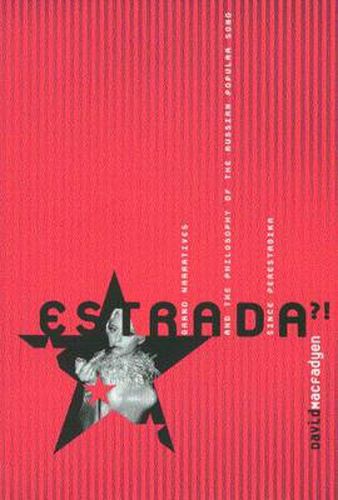Readings Newsletter
Become a Readings Member to make your shopping experience even easier.
Sign in or sign up for free!
You’re not far away from qualifying for FREE standard shipping within Australia
You’ve qualified for FREE standard shipping within Australia
The cart is loading…






In Estrada?!, the second volume of a three-part series on Russian popular song, David MacFadyen extends his overview of Russian culture and society into the post-Soviet period. Having dispelled several myths surrounding Soviet popular entertainment - known as estrada or the small stage - in Red Stars, MacFadyen shifts his attention to a newer musical tradition that has emerged from the simultaneous disappearance of Soviet ideology and the loud influx of western music. The author shows how performance, popularity, and politics have all changed rapidly in Russia following the fall of communism. He highlights the troubled state of Soviet music journalism in the eighties, the deteriorating standards of staging, and the problems of developing a proper post-Soviet repertoire given the weakened relevance of songs as propaganda and the tenuous value of an old-style sentimental education that performers hoped to offer audiences. MacFadyen shows that for Russia’s most famous performers today singing is still a responsibility of both private and public relevance. Even in post-Soviet Europe, song remains the most profoundly consequential of art forms.
$9.00 standard shipping within Australia
FREE standard shipping within Australia for orders over $100.00
Express & International shipping calculated at checkout
In Estrada?!, the second volume of a three-part series on Russian popular song, David MacFadyen extends his overview of Russian culture and society into the post-Soviet period. Having dispelled several myths surrounding Soviet popular entertainment - known as estrada or the small stage - in Red Stars, MacFadyen shifts his attention to a newer musical tradition that has emerged from the simultaneous disappearance of Soviet ideology and the loud influx of western music. The author shows how performance, popularity, and politics have all changed rapidly in Russia following the fall of communism. He highlights the troubled state of Soviet music journalism in the eighties, the deteriorating standards of staging, and the problems of developing a proper post-Soviet repertoire given the weakened relevance of songs as propaganda and the tenuous value of an old-style sentimental education that performers hoped to offer audiences. MacFadyen shows that for Russia’s most famous performers today singing is still a responsibility of both private and public relevance. Even in post-Soviet Europe, song remains the most profoundly consequential of art forms.